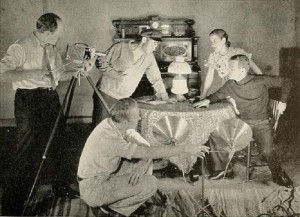
"Not One Word, by Kenneth F. Space, ACL, is an all around triumph of amateur photoplay production. It is a simple melodrama of the keeper of a lighthouse, his wife and the rejected suitor who returns. A wreck at sea (beautifully staged in miniature) is the complicating dramatic factor, and, with these ingredients, a dignified motion picture story of remarkable unity has been produced. In it, Mr. Space and his able staff have blended dramatic lighting, authentic settings and superb photography to achieve a distinguished whole. Under restrained but smoothly paced direction, the three leading players have enacted their roles with definite histrionic skill. If one were to try to select a single quality in the film which is outstandingly brilliant, the vote of this observer would be cast for the cutting. It is accurate and incisive, adding that last bit of dramatic "punch" which is perhaps the quality least often achieved by the amateur producer. Not One Word speaks for itself, but in the wordless and potent idiom of cinematic imagination." Movie Makers, Dec. 1934, 534.
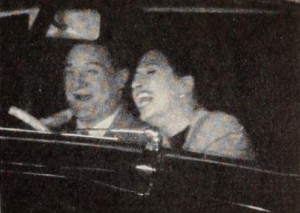
"Featuring a philandering wife, an illicit lover and a trusting husband, Olvido (Oblivion) proves once again, in the course of its sharply paced sequences, that the wages of sin is death. In it, the taut situations (which will lead at the last to murder and suicide) are so expertly directed and suavely acted that they develop always within the bounds of credibility. This achievement is especially noteworthy in an amateur photoplay of this melodramatic type. For others, attempting work in the same medium, have lapsed all too often into either the ridiculous or the farcical. Producers Oscar J. Bonello and Roberto Robertie, both officers of the Cine Club Argentino, in Buenos Aires, have used black and white film wisely, since its stark contrasts under low-key lighting are more effective than would be those of color. The Spanish sound track, employed sparingly and with dramatic force, is in keeping with the high standards of the rest of the picture." Movie Makers, Dec. 1952, 339.
"Once a Gentleman. When businessman Jones starts home he notes a damsel in distress on the street and offers to fix her flat tire. After a few drinks-in-her apartment later, he receives a letter demanding $1000 or his wife will be told of what is going on. But the blackmailer didn't count on Jones' deductive powers to find out just what has been going on. The film also won the MPD Club Film Award" PSA Journal, Sept. 1966, 35.
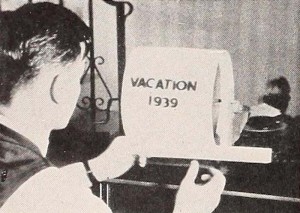
"When movie makers turn to movie making itself as the subject of a picture, sometimes they are a little self conscious and heavy handed — more particularly if the approach is humorous. This fault, the Dallas (Texas) Cine Club has successfully avoided in Out to Win, an opus that displays the adventures of a new convert to filming. The hero of the tale observes that everybody has a movie camera and that he is out of things. So his trombone and the equipment of other hobbies go to the "hock shop" to finance the purchase of a new cine camera. His wife isn't particularly sympathetic to movie making, and here the real humor enters, for Mrs. Movie Maker is not antagonistic; she is just oblivious to the real importance of movies. She walks in on her husband when he is developing titles, she tramps through film clips when he is editing; but, when the movie maker receives an incredible sum for a newsreel scoop (well handled airplane wreck sequence) and, in consequence, gets a check that enables the pair to buy a new car, Mrs. Movie Maker's attitude changes. In the last scene, she is proudly using a camera. The actors are excellent: they do not overplay their roles, and so the film is really funny." Movie Makers, Dec. 1939, 634-635.
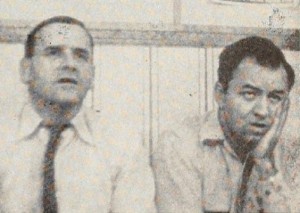
"Long a chef du cinema of pleasant family films concocted with a comedy flavor, George Valentine, has once again stirred up his favorite recipe. Outsmarted Smarties is a lively tale of a couple of mischievous husbands being outwitted by their wives. In his film, Mr. Valentine has combined clear plot structure, good cutting and sparkling lighting (especially in the interior scenes), to tie up a neat package with a punch ending. The acting is consistent with the demands of the story, and the attractive titles are intelligently inserted only where they are needed." Movie Makers, Dec. 1952, 339.
"Pipe Dreams, by Joseph Dephoure, ACL, and Edward Atkins, ACL, is ranked among the year's ten best because of its considerable triumphs over dramatic and technical difficulties. Through the imagination of its producers, a small cast, simple settings and moderate footage have been used to tell a big story, rich in pictorial effect. Dreaming that he has murdered his unfaithful wife, a young man sees in prospect the swift and fearful course of his life to the waiting gallows. The murder, the trial, the death cell and the hanging are represented in large part only by the imaginative and striking use of shadows of the real scenes. Occasional straight shots are heightened in effect by unusual angles and dramatic lighting. Sensitively planned, smartly executed and deftly cut, Pipe Dreams makes its simple story exciting and forceful." Movie Makers, Dec. 1933, 500.
"Film about the Woodley family’s attempts at Sunday morning relaxation when the Woodley boys are away at Sunday School." Library and Archives Canada.
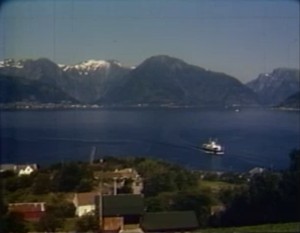
"In the summer of [1982], Robbins Barstow and his wife Meg, of Wethersfield, Connecticut, USA, went on a two-week tour of scenic Sweden and spectacular Norway. Join them in viewing beautiful sights and fascinating sites, all in dramatic color." Archive.org
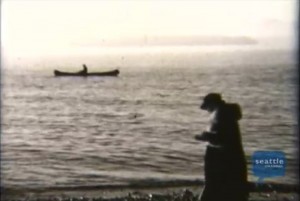
"This rare footage of Seattle and environs in the 1930s was shot by amateur filmmaker Iwao Matsushita. See downtown streets and sidewalks, Lincoln Park, Seward Park, Volunteer Park, a UW football game, rambunctious kitties and other surprises from more than 60 years ago." Seattle Channel.
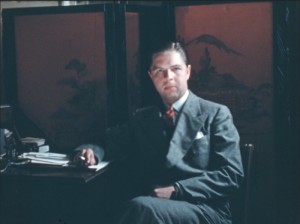
A woman is tempted with thoughts of another man after her husband disappoints her on their anniversary. Will she follow through with the act, or will she remain faithful to her husband?
Total Pages: 6